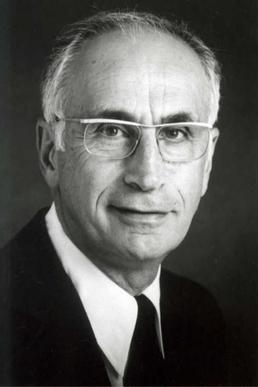Economics is a social science that studies the production, distribution, and consumption of goods and services.

Ronald Harry Coase was a British economist and author. Coase was educated at the London School of Economics, where he was a member of the faculty until 1951. He was the Clifton R. Musser Professor of Economics at the University of Chicago Law School, where he arrived in 1964 and remained for the rest of his life. He received the Nobel Memorial Prize in Economic Sciences in 1991.

Environmental economics is a sub-field of economics concerned with environmental issues. It has become a widely studied subject due to growing environmental concerns in the twenty-first century. Environmental economics "undertakes theoretical or empirical studies of the economic effects of national or local environmental policies around the world. ... Particular issues include the costs and benefits of alternative environmental policies to deal with air pollution, water quality, toxic substances, solid waste, and global warming."

In economics, an externality or external cost is an indirect cost or benefit to an uninvolved third party that arises as an effect of another party's activity. Externalities can be considered as unpriced goods involved in either consumer or producer market transactions. Air pollution from motor vehicles is one example. The cost of air pollution to society is not paid by either the producers or users of motorized transport to the rest of society. Water pollution from mills and factories is another example. All consumers are made worse off by pollution but are not compensated by the market for this damage. A positive externality is when an individual's consumption in a market increases the well-being of others, but the individual does not charge the third party for the benefit. The third party is essentially getting a free product. An example of this might be the apartment above a bakery receiving the benefit of enjoyment from smelling fresh pastries every morning. The people who live in the apartment do not compensate the bakery for this benefit.

In neoclassical economics, market failure is a situation in which the allocation of goods and services by a free market is not Pareto efficient, often leading to a net loss of economic value. Market failures can be viewed as scenarios where individuals' pursuit of pure self-interest leads to results that are not efficient – that can be improved upon from the societal point of view. The first known use of the term by economists was in 1958, but the concept has been traced back to the Victorian philosopher Henry Sidgwick. Market failures are often associated with public goods, time-inconsistent preferences, information asymmetries, non-competitive markets, principal–agent problems, or externalities.
Duncan Black, FBA was a Scottish economist who laid the foundations of social choice theory. In particular he was responsible for unearthing the work of many early political scientists, including Charles Lutwidge Dodgson, and was responsible for the Black electoral system, a Condorcet method whereby, in the absence of a Condorcet winner, the Borda winner is chosen.

Law and economics, or economic analysis of law, is the application of microeconomic theory to the analysis of law. The field emerged in the United States during the early 1960s, primarily from the work of scholars from the Chicago school of economics such as Aaron Director, George Stigler, and Ronald Coase. The field uses economics concepts to explain the effects of laws, to assess which legal rules are economically efficient, and to predict which legal rules will be promulgated. There are two major branches of law and economics; one based on the application of the methods and theories of neoclassical economics to the positive and normative analysis of the law, and a second branch which focuses on an institutional analysis of law and legal institutions, with a broader focus on economic, political, and social outcomes, and overlapping with analyses of the institutions of politics and governance.
In law and economics, the Coase theorem describes the economic efficiency of an economic allocation or outcome in the presence of externalities. The theorem is significant because, if true, the conclusion is that it is possible for private individuals to make choices that can solve the problem of market externalities. The theorem states that if the provision of a good or service results in an externality and trade in that good or service is possible, then bargaining will lead to a Pareto efficient outcome regardless of the initial allocation of property. A key condition for this outcome is that there are sufficiently low transaction costs in the bargaining and exchange process. This 'theorem' is commonly attributed to Nobel Prize laureate Ronald Coase.
The Chicago school of economics is a neoclassical school of economic thought associated with the work of the faculty at the University of Chicago, some of whom have constructed and popularized its principles. Milton Friedman, and George Stigler are considered the leading scholars of the Chicago school.
Institutional economics focuses on understanding the role of the evolutionary process and the role of institutions in shaping economic behavior. Its original focus lay in Thorstein Veblen's instinct-oriented dichotomy between technology on the one side and the "ceremonial" sphere of society on the other. Its name and core elements trace back to a 1919 American Economic Review article by Walton H. Hamilton. Institutional economics emphasizes a broader study of institutions and views markets as a result of the complex interaction of these various institutions. The earlier tradition continues today as a leading heterodox approach to economics.
The post-autistic economics movement, or movement of students for the reform of economics teaching, is a political movement that criticises neoclassical economics and advocates for pluralism in economics. The movement gained attention after an open letter signed by almost a thousand economics students at French universities and grandes ecoles was published in Le Monde in 2000.

Armen Albert Alchian was an American economist. He spent almost his entire career at the University of California, Los Angeles (UCLA). A major microeconomic theorist, he is known as one of the founders of new institutional economics and widely acknowledged for his work on property rights.

Heterodox economics is any economic thought or theory that contrasts with orthodox schools of economic thought, or that may be beyond neoclassical economics. These include institutional, evolutionary, feminist, social, post-Keynesian, ecological, Austrian, humanistic, complexity, Marxian, socialist, anarchist and modern monetary theory economics.
Entrepreneurial economics is the field of study that focuses on the study of entrepreneur and entrepreneurship within the economy. The accumulation of factors of production per se does not explain economic development. They are necessary factors of production, but they are not sufficient for economic growth.
New Institutional Economics (NIE) is an economic perspective that attempts to extend economics by focusing on the institutions that underlie economic activity and with analysis beyond earlier institutional economics and neoclassical economics. Unlike neoclassical economics, it also considers the role of culture and classical political economy in economic development.
George Lennox Sharman Shackle was an English economist. He made a practical attempt to challenge classical rational choice theory and has been characterised as a "post-Keynesian", though he is influenced as well by Austrian economics. Much of his work is associated with the Dempster–Shafer theory of evidence.
The pluralism in economics movement is a campaign to change the teaching and research in economics towards more openness in its approaches, topics and standpoints it considers. The goal of the movement is to "reinvigorate the discipline ... [and bring] economics back into the service of society". Some have argued that economics had greater scientific pluralism in the past compared to the monist approach that is prevalent today. Pluralism encourages the inclusion of a wide variety of neoclassical and heterodox economic theories—including classical, Post-Keynesian, institutional, ecological, evolutionary, feminist, Marxist, and Austrian economics, stating that "each tradition of thought adds something unique and valuable to economic scholarship".
The Problem of Social Cost (1960) is a law review article by Ronald Coase, then a faculty member at the University of Virginia, dealing with the economic problem of externalities. It draws from a number of English legal cases and statutes to illustrate Coase's belief that legal rules are only justified by reference to a cost–benefit analysis, and that nuisances that are often regarded as being the fault of one party are more symmetric conflicts between the interests of the two parties. If there are sufficiently low costs of doing a transaction, legal rules would be irrelevant to the maximization of production. Because in the real world there are costs of bargaining and information gathering, legal rules are justified to the extent of their ability to allocate rights to the most efficient right-bearer.
In economics, willingness to accept (WTA) is the minimum monetary amount that а person is willing to accept to sell a good or service, or to bear a negative externality, such as pollution. This is in contrast to willingness to pay (WTP), which is the maximum amount of money a consumer is willing to sacrifice to purchase a good/service or avoid something undesirable. The price of any transaction will thus be any point between a buyer's willingness to pay and a seller's willingness to accept; the net difference is the economic surplus.
Real-World Economics Review is a peer-reviewed open access academic journal of heterodox economics published by the "Post-Autistic Economics Network" since 2000. Since 2011 it is associated with the World Economics Association. It was known formerly as the Post-Autistic Economics Review and the Post-Autistic Economics Newsletter. Previous issues are archived on its website. Two sister journals from the same publisher are Economic Thought and World Economics Review.






